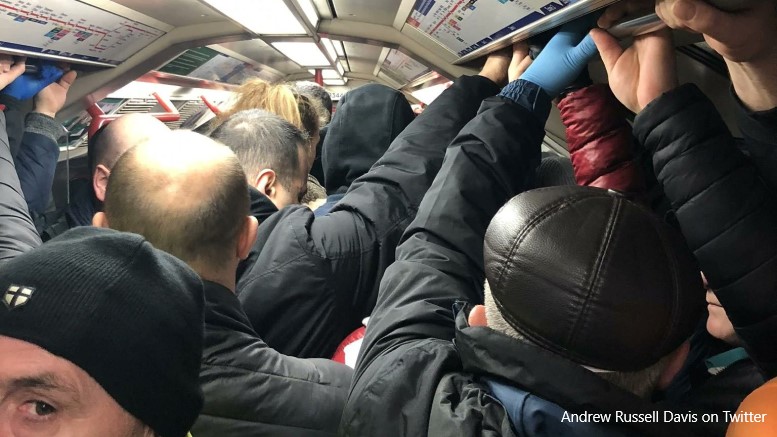
People who normally use public transport to commute to work are nervous about doing so when the lockdown ends unless social distancing is in place.
That’s the result of a survey carried out by independent watchdog Transport Focus. A sample of 2,000 people around the country was questioned on 1-3 May 2020 and nearly two thirds said they expect social distancing to be in place on transport after lockdown restrictions are lifted.
As a result, Transport Focus is calling for government and the transport industry to outline how they will reassure passengers that it will be safe as possible to travel by public transport.
Example responses
One typical response from a passenger said: “I will be nervous about travelling by train or bus as I don’t see how social distancing will work. I think it will be important that people are not crowded together for a long time.”
Other responses included: “I think I will be reluctant to use public transport once restrictions are eased because of the close proximity of people on trains or buses. You cannot guarantee you will get any distance between you and other passengers.”
“I think that they will have to limit the number of people who can use every bus, train carriage etc. People will have to wear masks, and transport companies will have to disinfect daily. I also think that people will be very nervous of using public transport for a while.”
“People will respect social distancing and be scared to sit next to each other on tube or bus or train. People will want to wear masks and gloves. Still prefer to travel by car than public transport.”
“We will be back to congested roads and because people will be ‘raring to go’ there will also be mayhem, perhaps a few more road traffic accidents.”
“I’m hoping that more people will walk instead of using the car for short journeys. I also hope that a lot of people currently working from home continue to do so, as it means there is far less traffic and less pollution.”
Overall, responses from people in London showed they were more likely to look to cycle and walk more, rather than catch public transport, those outside London are more likely to switch to driving. Transport Focus is therefore calling for government to ensure that ‘active travel’ is encouraged, to prevent roads becoming more congested.

What needs to be done
Commenting on the survey findings, Transport Focus chief executive Anthony Smith said: “After months of being told not to travel people will understandably be fearful about venturing out.
“The government must outline in its upcoming roadmap for easing lockdown what measures it will put in place to reassure people they can travel safely.”
London TravelWatch participated in the survey alongside Transport Focus to discover how Londoners, who face some of the longest and most crowded commutes in the country, feel about the prospect about returning to public transport.

Emma Gibson, director of London TravelWatch, added: “It is interesting to see that Londoners place more importance on people wearing face masks as they move around the capital than people in other areas around the UK and that a higher percentage of Londoners in the survey would travel without social distancing or hand sanitiser available at stations or stops. Perhaps that is because they rely on public transport more than anyone else in the country.
“Like everyone, Londoners are concerned about travelling once restrictions are lifted in the capital, but a greater number of people intend to walk and cycle more often, compared to other parts of the country. Also bucking the trend, Londoners are less likely to say that they will drive more in order to avoid using public transport.”
Survey findings
From the survey of 2,000 people, the key findings were:
- 83% think hand sanitiser should be available on public transport vehicles, at stations, and at stops;
- 62% won’t use public transport unless social distancing is in place;
- 51% wouldn’t be happy using public transport unless passengers are required to wear face masks;
- As an age group, people aged 18-24 are most comfortable about returning to public transport (40%);
- Geographically, people in Scotland (32%) and the West Midlands (29%) are the most likely to go back to public transport, with those in the North West least happy (19%).


Be the first to comment